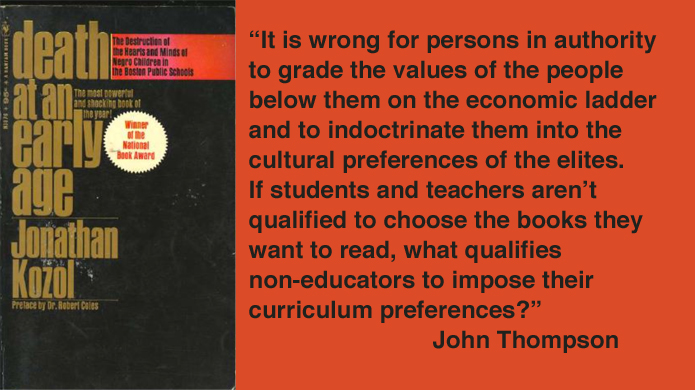50 Years Later: Jonathan Kozol’s "Death at an Early Age"

The 50th anniversary of Jonathan Kozol’s Death at an Early Age comes as we confront the horror of the Charleston, S.C. massacre and the epidemic of police killings of unarmed blacks. At a time like this, it is best to read Kozol’s masterpiece on its own, without using it as evidence for any side of our current edu-political conflicts. After a decent interval for letting the tragedies sink in, we can then draw upon it as we debate contemporary school policy.
The subtitle of Death at an Early Age is The Destruction of the Hearts and Minds of Negro Children in the Boston Public Schools. It is an unrelenting indictment of the segregated Boston Public School System in 1965. Back then, I was twelve years old and I didn’t know a single black person, and George Washington Carver was the only black person in our textbooks. It was easy for an Oklahoman like me, however, to grasp the overt racism of “the Redneck.” As Kozol knew, it would be far harder to comprehend the covert racism of “the Reading Teacher.” As he guides us through his quest to understand the Reading Teacher, however, Kozol reveals the disgusting soul of Boston’s curriculum, its governance, and its segregation.
The Redneck seemed to be the most honest teacher in this predominantly poor and black elementary school. He’d been treated rough while growing up and so were the black children who he was supposed to teach. The Redneck exemplified the mentality of “we did it, and we never had any fancy schools either.” He said he was just as “culturally deprived” as Negroes, and:
I don’t need anyone to tell me. I haven’t learned a thing, read a thing that I wished I’d read or learned since the day I entered high school, and I’ve known it for years and I tried to hide it from myself and now I wish I could do something about it but I’m afraid it’s just too late.
In perhaps the most straightforward conclusion in Kozol’s nuanced analysis of prejudice and segregation, he observed, “Former Irish boys beaten by Yankee schoolmasters may frequently make ungenerous 50 Years Later: Jonathan Kozol’s "Death at an Early Age" - Living in Dialogue:
